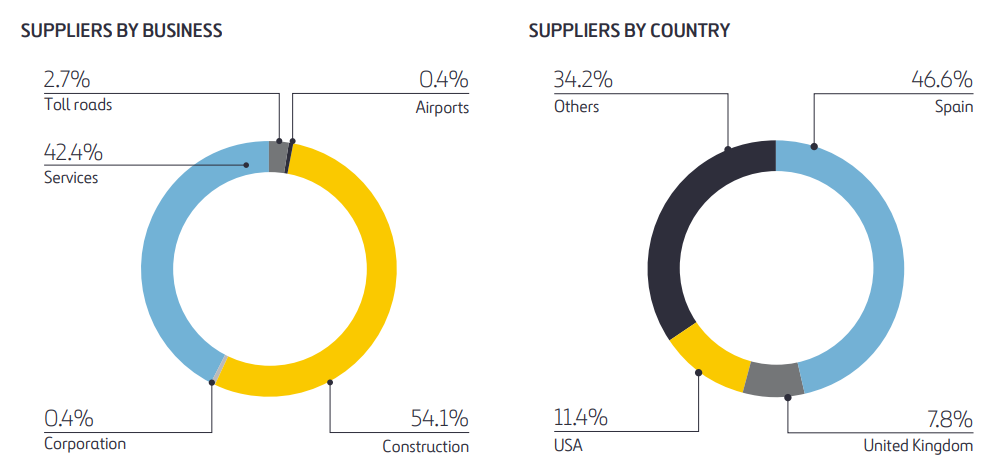-
1. Management Report 2021
- 1.1 In two minutes
- 1.2 Strategy and value creation
- 1.3 Ferrovial in 2021
- 1.4 Risks
- 1.5 Corporate Governance
- 1.6 Expected Business Performance in 2022
-
Appendix
- Alternative Performance Measures
- Sustainability Management
- Reporting Principles
- European Taxonomy
- Task Force on Climate Related Disclosures
- Scoreboard
- Contents of Non-Financial Information Statements
- SASB Indicators
- GRI Standard Indicators
- Appendix to GRI Standards Indicators
- Glosary of Terms
- Verification Report
-
2. Consolidated Financial Statements 2021
- Consolidated Financial Statements
- Audit Report
Supply Chain
Applying ESG criteria
Integrating ESG criteria into supply chain management by fostering innovation and promoting sustainable procurement is a priority.
NUMBER OF SUPPLIERS
NUMBER OF SUPPLIERS ASSESSED
PURCHASES FROM LOCAL SUPPLIERS
Ferrovial promotes sustainability in its supply chain through the incorporation of tools, the development of procedures and the promotion of innovative projects that provide detailed knowledge of the type of suppliers with which it works.
INTEGRATION OF ESG PRINCIPLES IN THE SUPPLY CHAIN
In 2021 Ferrovial updated its Suppliers Ethical Integrity Due Diligence Procedure, which incorporates the Suppliers Code of Ethics. It is a mandatory requirement for suppliers in orders and contracts, and includes the basic principles that must govern the behavior of all suppliers in their commercial relationship with the company. It is aligned with and complements other corporate policies, especially the Code of Ethics, Corporate Responsibility, Human Rights, Quality and Environment and Anticorruption policies. The Supplier Code of Ethics is available on the Ferrovial website.
The company analyzes the degree of criticality of all its suppliers, understanding a critical supplier to be one whose purchasing volume is significant from an economic point of view for the business it serves, or one whose supplies or services could have a negative impact on business continuity in the event of an incident. In this regard, at the end of 2021 there were 2,724 critical suppliers identified.
Suppliers are also analyzed from the point of view of sustainability. On this matter, suppliers are classified as high-risk suppliers if they supply products considered risky or from sectors characterized as high-risk, and if they manufacture the products supplied in countries considered risky. In the case of Ferrovial, this list is limited to some suppliers of personal protective equipment. By the end of 2021, this list consisted of 213 suppliers, all of which are subject to special monitoring.
It should be noted that all model orders and contracts include environmental, social and labor, health and safety, compliance with the Global Compact Principles, as well as ethics and anticorruption clauses, in line with the Code of Ethics and Compliance Policies, thus ensuring compliance with ESG requirements.
Supplier performance evaluation and monitoring processes also include ESG criteria. Thus, the Construction business has an IT application for the evaluation and monitoring of each supplier based on the evaluations carried out at each construction site or work center. The evaluation includes, among other aspects, compliance with Health and Safety and Occupational Risk Prevention, Anticorruption Policy and environmental criteria. These evaluations allow the identification of suppliers on an ongoing basis, and are available at an international level for both site managers and other authorized personnel involved in the purchasing and supplier management process. In addition, the computerized management system has been updated to facilitate real-time communication of evaluations with incidents or poor Health and Safety performance, so that purchasing managers can take appropriate action in the shortest possible time.
The result of the evaluations may result in a warning to the supplier, the establishment of an action plan for improvement, or even disqualification from working with Ferrovial, depending on the seriousness of the case, especially if non-compliance with the Anticorruption Policy is verified.
During 2021, 25,170 suppliers joined Ferrovial’s supply chain and more than 12,000 were assessed, of which less than 1% were rejected. In terms of supplier invoicing, a total of 28.1% corresponded to critical suppliers, while 96.93% came from local suppliers.
INNOVATION FOR A MORE SUSTAINABLE PROCUREMENT
Ferrovial develops innovation projects and applies new technologies to achieve a more agile, efficient and transparent supply chain, which in turn enables sustainable procurement to be gradually incorporated, thus extending sustainability principles to its entire value chain.
In this respect, the most noteworthy initiatives are the following:
- Purchase of electricity from renewable sources: the company promotes, whenever possible, the purchase of electricity with a guarantee of origin and is progressively moving towards the 100% target in 2025 established in the Horizon 24 plan. In 2021, 78% of the electricity purchased was produced from renewable sources.
- Efficient vehicle fleet: most of the fleet is managed through agreements with a lease/renting period of up to 3 years, which facilitates a complete renewal of the fleet with efficient vehicles, resulting in a substantial and continuous reduction in emissions levels. Hybrid, gas and electric vehicles continue to be added to the fleet, with the target of reaching a 33% zero-emission fleet by 2030, as set in the Horizon 24 plan.
- Green Purchasing Catalog: during the last year, the information available in the catalog has continued to be updated and increased to promote the purchase of this type of sustainable products. In Construction, alternatives for the supply of green products with Environmental Product Declarations and Ecolabel products have been incorporated, as well as other information accrediting the improvements in sustainability that are made available to customers both in the contracting and execution phases.
- Digitization in purchasing processes: in 2021, the objective of incorporating the digitization of essential documents of the process, such as supplier offers and contract documents, into the computerized purchasing management system was completed, and progress has been made in the digitization of delivery notes and invoices to complete its deployment in 2022.
“Supplier 360” Project at Ferrovial
Ferrovial has implemented the “Supplier 360” application in its Construction, Services and other businesses in Spain. This IT tool monitors suppliers using advanced data analytics techniques, language processing and internet searches. This enables potential risks to be detected, whether financial, environmental, legal, labor or reputational. This tool provides additional information to that already available in the supplier databases, both for the selection, contracting and monitoring phases.
In fiscal year 2021, its functionality has been extended to cover suppliers and sources of information in the USA and the UK. It has also been prepared to incorporate other business areas, such as Toll Roads, which will be able to use it regularly in 2022.
At the end of 2021, monitoring of the 120 most relevant suppliers of Ferrovial Construction in these two markets, which represent more than 60% of supplier turnover in these countries, had begun. The tool has reported a total of 44,463 pieces of information about them, obtained from the different websites and platforms it accesses.

